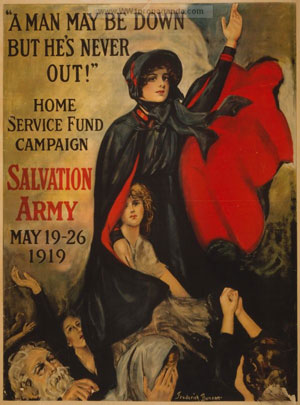 The American Red Cross in World War I was usually seen as a group of ladies who met weekly to fold bandages made of old bed sheets for the injured soldiers along the Western Front. However, in the fall of 1918 the Red Cross created a new job for Texas volunteers. The National Red Cross Home Service Institute held six-weeks sessions to train the volunteers in visiting and aiding families of soldiers and sailors who were at war.
The American Red Cross in World War I was usually seen as a group of ladies who met weekly to fold bandages made of old bed sheets for the injured soldiers along the Western Front. However, in the fall of 1918 the Red Cross created a new job for Texas volunteers. The National Red Cross Home Service Institute held six-weeks sessions to train the volunteers in visiting and aiding families of soldiers and sailors who were at war.
The institute was the outcome of hundreds of appeals for advice and financial assistance from soldiers and sailors who were worried about the folks back home. To instruct in the care of their families, so that they will not feel like objects of charity, is the mission of the institute.
Each day presented new home service problems and the highest degree of efficiency in their solution can be assured only through a thorough training in modern methods. Social work as a profession was new, and never before had there been such a need for experts in this work. The Institute presented an opportunity for excellent training with soldiers’ and sailors’ families under the supervision of the instructors.
Seven Red Cross chapters sent volunteers to the National Red Cross Home Service Institute from Texas. They included Greenville, McKinney, Fort Worth, Amarillo, Memphis, El Paso, and Brenham.
Classes ran five days a week the first and last weeks, and four days, Monday through Thursday, on the middle four weeks. Dr. Ivan Lee Holt, chaplain of Southern Methodist University, was the director and lead lecturer. Others included home economic professors, supervisor of the Dallas Free Kindergarten Training School, the director of sanitation for the City of Dallas, supervisor of the United Charities, and Rabbi Henry Cohen, well known for his charity work in Galveston.
In addition to lecture times, twenty-five hours of related reading were expected each week. Volunteers were instructed in how to begin the interview, problems of the family and how to formulate a plan regarding them, and several sessions regarding food, disease, hygiene and sanitation. Before the volunteers were sent out into the communities, they must pass examinations.
It seems that most of the volunteers were women who could bond with the families. While in the twenty-first century we recognize the concern of soldiers and sailors about their families, such was not the case until fairly recently. The National Red Cross Home Service Institute was in the forefront of such solutions to the problems.
